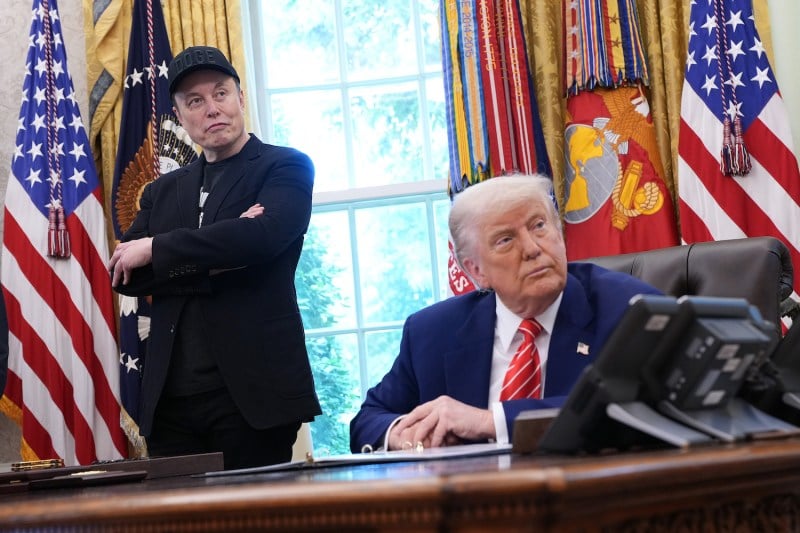Don’t Trust Russia to Mediate the Iran Nuclear Deal

Don’t Trust Russia to Mediate the Iran Nuclear Deal
Moscow’s interests go directly against Washington’s in the Middle East.
Russian President Vladimir Putin and Iranian President Masoud Pezeshkian deliver a press statement following their talks at the Kremlin in Moscow on Jan. 17.
Vyacheslav Prokofyev/AFP/Pool via Getty Images
This month, Russian President Vladimir Putin agreed to mediate a new nuclear agreement between the United States and Iran after reportedly being asked to by U.S. President Donald Trump in a phone call in February. In a meeting hosted by Saudi Arabia, U.S. Secretary of State Marco Rubio allegedly followed up on the president’s request in speaking with his Russian counterpart, Foreign Minister Sergey Lavrov. Trump has made clear he wants a new deal with Iran. He said as much when he signed an executive order last month reimplementing the maximum pressure campaign. He did so again this month, reportedly, in a letter he sent directly to Iran’s supreme leader, Ayatollah Ali Khamenei.
The White House should immediately abandon this unwise pursuit. Simply put, Russia’s shared interests with Iran make it an unsuitable mediator and will surely work to undermine America’s interests in the Middle East and those of America’s partners and allies. Long an arsonist in the Middle East, Washington should distrust Moscow’s attempt to don a firefighter’s helmet now.
This month, Russian President Vladimir Putin agreed to mediate a new nuclear agreement between the United States and Iran after reportedly being asked to by U.S. President Donald Trump in a phone call in February. In a meeting hosted by Saudi Arabia, U.S. Secretary of State Marco Rubio allegedly followed up on the president’s request in speaking with his Russian counterpart, Foreign Minister Sergey Lavrov. Trump has made clear he wants a new deal with Iran. He said as much when he signed an executive order last month reimplementing the maximum pressure campaign. He did so again this month, reportedly, in a letter he sent directly to Iran’s supreme leader, Ayatollah Ali Khamenei.
The White House should immediately abandon this unwise pursuit. Simply put, Russia’s shared interests with Iran make it an unsuitable mediator and will surely work to undermine America’s interests in the Middle East and those of America’s partners and allies. Long an arsonist in the Middle East, Washington should distrust Moscow’s attempt to don a firefighter’s helmet now.
Believing Putin shares America’s long-held, bipartisan interest in forever preventing the development of an Iranian bomb is tantamount to believing the wolf can negotiate on behalf of the fox to reach a nonaggression pact with the hen house. The wolf and the fox are more likely to carve up the chickens between them than negotiate a deal in good faith that preserves the poultry.
With respect to Europe, Trump has shifted U.S. policy precipitously. Whereas former President Joe Biden sought to work with NATO allies to support Ukraine’s defense against an illegal and unprovoked war of aggression by Russia, Trump has swung away from Kyiv, openly criticizing Ukraine and America’s European allies for being ungrateful for U.S. support and insufficiently capable of providing for their own security. While Trump clearly seeks rapprochement with Russia over the future of Ukraine, it would be an error to invite Moscow to play intermediary with Iran over the nuclear issue.
At every turn, Russia has undermined U.S. national interests in the Middle East by supporting America’s regional adversaries and by extension, the security of Israel and America’s partners in the Gulf such as Saudi Arabia and the United Arab Emirates. Russia worked in parallel with Iran to prop up Bashar al-Assad’s murderous regime over more than a decade of civil war. Along with Iran, Russian forces and mercenaries terrorized and brutalized the Syrian people on Assad’s behalf.
Today, Russia harbors Assad himself, who fled Syria late last year when his rule finally collapsed, following a well-timed offensive from resistance group Hayat Tahrir al-Sham. Before Assad’s fall, Russia armed Hezbollah with advanced weapons for use against Israel. Following Israel’s recent operations, which have largely vanquished Hezbollah from southern Lebanon as an effective fighting force, Israel’s military assessed that 60 percent to 70 percent of the enemy’s weapons were of Russian origin.
Russia has armed and supported the Houthis in Yemen, a violent insurgency that also receives major support from Iran. Moscow has aided and abetted the Houthis’ attacks on shipping in the Red Sea, which have disrupted commercial shipping globally and cost Egypt billions of dollars in needed revenue from lost shipping traffic in the Suez Canal.
Moscow has directly supported Iran, both militarily and economically. Russia has advised Iran on its ballistic missile program, which Tehran twice used when it fired barrages of missiles on Israeli cities and towns, last year. In responding to those attacks, Israel wisely targeted Iran’s S-300 air defense radars, a formidable weapons system Russia previously provided to Iran.
Economically, Russia has brazenly defied U.S. sanctions on Iran, engaging in trade and investment. They have evolved from competitors in the energy market into partners, as Russia has invested in Iran’s oil and gas infrastructure. Russia’s economic engagement with Iran has worked to undermine American sanctions and weaken their coercive impact, enabling Iran’s economy to subsist and the Islamic Revolutionary Guard Corps’ Quds Force to carry on its malign activities throughout the Middle East and beyond. Earlier this year, Russia and Iran signed a cooperation treaty codifying their expanded relations in the security and economic realms.
The expanding economic and military dependency between Iran and Russia suggests that Russia enjoys some degree of leverage over Iran, and could, if it chose to, assist in delivering a meaningful nuclear agreement with Tehran. However, Moscow has proved its interests more closely parallel Tehran’s than Washington’s and would likely exploit any role in the negotiation to pressure U.S. interests. For but one example, with Iran reaching a threshold status in its nuclear program, Russia could close any technological gap in Iran’s nuclear pursuit, putting Tehran over the finish line at any time. Russia is more likely to leverage that in pursuit of its own interests against the United States in Europe, the Middle East, and anywhere else it seeks strategic advantage at the expense of America and its allies. Thus, inviting Russia to the table will only serve to strengthen Iran’s hand at the expense of the United States and any like-minded nations determined to not see Iran develop the bomb.
Trump has made very clear that he wants a deal with Iran, and his recently restored maximum pressure campaign is in service of that end. Preventing an Iranian nuclear weapon is of critical importance to U.S. security and the security of Israel and partners throughout the Middle East.
With the stakes this high, the United States should not rely on an adversary like Russia that has worked against American interests time and time again. Instead, Trump should convene the E3 states—the United Kingdom, France, and Germany—countries that share U.S. interests in ensuring Iran does not acquire a nuclear weapon.
Trump should enlist these nations in making the maximum pressure campaign a multilateral effort, and in coordination with these allies, approach Iran to negotiate a deal from a position of strength. While Trump has expressed differences with allies on Europe’s defense, the president should recognize interests Washington shares with London, Paris, and Berlin on the Iranian nuclear issue, and he should leverage them.
While the E3 refused to leave the Joint Comprehensive Plan of Action in 2018, Trump will likely find their positions have shifted significantly in the years since. The E3 is likely ready to join with Trump in making the maximum pressure campaign a more effective, multilateral effort, generating a great deal more leverage in a future negotiation. By working with America’s allies, Trump can pursue a deal that prevents Iran from ever completing a nuclear weapon, delivering on his promise of “peace through strength.”
Jonathan Lord is a senior fellow and the director of the Middle East Security Program at the Center for a New American Security, a former staff member for the U.S. House Armed Services Committee, a former Iraq country director in the Office of the Under Secretary of Defense for Policy, and a former political military analyst in the Department of Defense. X: @JonathanLordDC
More from Foreign Policy
-

A Ukrainian machine-gunner holds an American FIM-92 Stinger portable air defense missile system for the reconnaissance and destruction of Russian drones in Zaporizhzhia, Ukraine, on Dec. 2, 2024. How Trump Is Killing the U.S. Defense Industry
It turns out that abandoning allies and tossing out security guarantees is bad for business.
-

Ukrainian President Volodymyr Zelensky talks to a group of European leaders on the sidelines of a summit in Kyiv on Feb. 24, the third anniversary of Russia’s full-scale invasion of Ukraine. Europe Is Now Led by Its North
The Nordics and Baltics are together inspiring visions of a stronger continent.
-

Trump stands at a podium with both arms outstretched and his hands open as he speaks. He wears a dark suit and a bright red tie. Trump Is Trying to Remake the United Nations
Washington has signaled that it wants the international body to focus on preserving peace, but it could be looking to rubber-stamp its bilateral priorities.
-

Donald Trump speaks during a campaign rally at Van Andel Arena on November 5, 2024 in Grand Rapids, Michigan. Trump’s Concert of Kingpins Won’t Work
A globe carved up by strongmen isn’t any world order at all.








Join the Conversation
Commenting on this and other recent articles is just one benefit of a Foreign Policy subscription.
Already a subscriber?
.
Subscribe
Subscribe
View Comments
Join the Conversation
Join the conversation on this and other recent Foreign Policy articles when you subscribe now.
Subscribe
Subscribe
Not your account?
View Comments
Join the Conversation
Please follow our comment guidelines, stay on topic, and be civil, courteous, and respectful of others’ beliefs.
Change your username |
Log out
Change your username:
CANCEL
Confirm your username to get started.
The default username below has been generated using the first name and last initial on your FP subscriber account. Usernames may be updated at any time and must not contain inappropriate or offensive language.